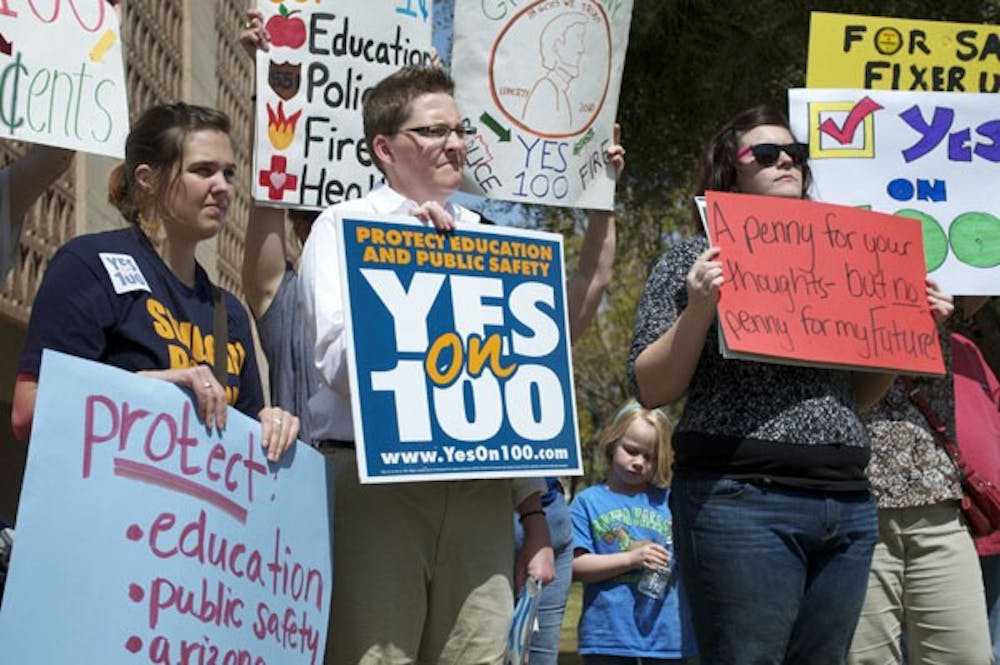Some ASU members of the Arizona Students’ Association board of directors are calling for a restructuring of the organization to solve problems that may have limited the group’s progress this year.
The board members have expressed frustration over the organization’s voting policy, the University’s representation within the group and internal disputes among members.
ASA — a lobbying group made up of student government presidents and appointed members from ASU, UA and NAU — works to make higher education affordable and accessible to students, according to the organization’s mission statement.
“The structure of the organization is flawed; that’s my opinion,” said board member Justin Boren, president of the Graduate and Professional Students Association.
Each semester, students at all three universities pay a refundable $2 fee, which funds ASA’s endeavors.
The group, created in 1974, is currently advocating for state initiatives and legislation it deems beneficial for university students, such as Proposition 100 — a sales tax increase — and a bill that would make it easier to transfer courses from community colleges to the three Arizona universities.
On March 8, three days before the Arizona Board of Regents agreed to the universities’ tuition increase proposals, Boren sent a letter to the ASA’s Board of Directors with concerns that the organization’s board members were “not being strong fiduciaries of the students’ financial contribution.”
“Due to political in-fighting between board members, this year has been a waste,” Boren said in the letter. “Honestly, we should all be ashamed of ourselves.”
ASA Chair Elma Delic acknowledged conflict within the organization.
“There have been some internal problems with a few board members,” she said.
But Delic said the views expressed in Boren’s letter do not reflect those of the organization.
Boren’s letter criticizes ASA’s voting procedures, which he says could put the future of the association at risk.
“The way that the association is organized in relation to voting is incredibly troublesome,” Boren wrote in the letter.
ASA is broken into three districts — Northern (NAU), Central (ASU) and Southern (UA). In order for a measure to pass the board, it must first be approved by a majority vote in each district.
“If any one district decides not to vote, or to not pass it, then that issue is dead,” Boren said.
Boren said this process is strange because ASU students contribute more than 50 percent to ASA’s general fund, which consists of more than $500,000.
“A lot of times people from ASU feel like we’re underrepresented on the board of equal representation,” said ASA Vice Chair and ASU student Ben Henderson. “That’s been a point of contention in the past from ASU directors.”
Delic said the voting bylaws were originally set up to ensure fair representation of all three universities’ students.
“We thought [this structure] was best to not … give one or two districts control over the other,” Delic said.
Other board members have taken issue with ASA’s use of proxy votes — votes of board members absent from meetings, which are used by members of the same district.
ASU student, board member and West campus student government president Andrew Clark said proxy votes allow “one unelected child [to control] the fate of 120,000 students.”
In his letter, Boren suggested the elimination of proxy voting.
“At no time should decisions be blocked because one board member is holding multiple proxy votes,” the letter states. “If people want to vote, they should show up.”
NAU student and board secretary Lauren Talkington said it is difficult for students from Flagstaff to make the meetings that are held in Tuscon and Phoenix, mainly due to weather-related issues.
“Voting proxy has allowed us to bring our voices to the table,” Talkington said.
At the board’s Feb. 19 meeting, Talkington utilized the proxy votes of two absent NAU board members in order to squash a motion unanimously passed in ASU’s district.
The motion, if passed, would have hired a consulting firm to conduct a search for ASA’s new executive director. Because the motion failed to pass NAU’s district, UA did not vote on the issue.
Since that meeting, ASA has yet to make any progress on the hiring of the executive director, a position held temporarily by Robyn Nebrich. Nebrich has been employed by ASA since 2005 and became interim executive director after the former director left in December.
Boren’s letter criticizes ASA for many different issues, including the support of graduate students and the perceived failures of multiple committees. He also encourages other board members to find solutions for these issues.
Clark mentioned three options when speaking about the direction of ASA’s future.
“There’s the nuclear option — you just dissolve the organization, give everyone their money back,” Clark said. “There’s the nearly nuclear option, which is you just take the money, give it to ASU and let the ASU student governments lobby on behalf of ASU. … Or you go to the restructuring of the board — take it down to just the student body presidents knowing that they’re elected. You maybe do a vote that’s majority rather than district-by-district so we don’t all fight each other all the time.”
Henderson said the absence of ASA would damage the power of the students.
“I really think if you didn’t have ASA, you’d see a significant lack of student voices around the state,” Henderson said.
One of the other options — to “fix” ASA — would not be easy, Clark said.
“You’re going to have to really spend about a year in intense negotiation, and probably intense bickering and fighting to get anything done,” he said. “I don’t think anybody wants to do that. I think it’s a waste of students’ time, money, etc. But that’s what it’s going to take.”
Reach the reporters at kjdaly@asu.edu and joseph.schmidt@asu.edu





